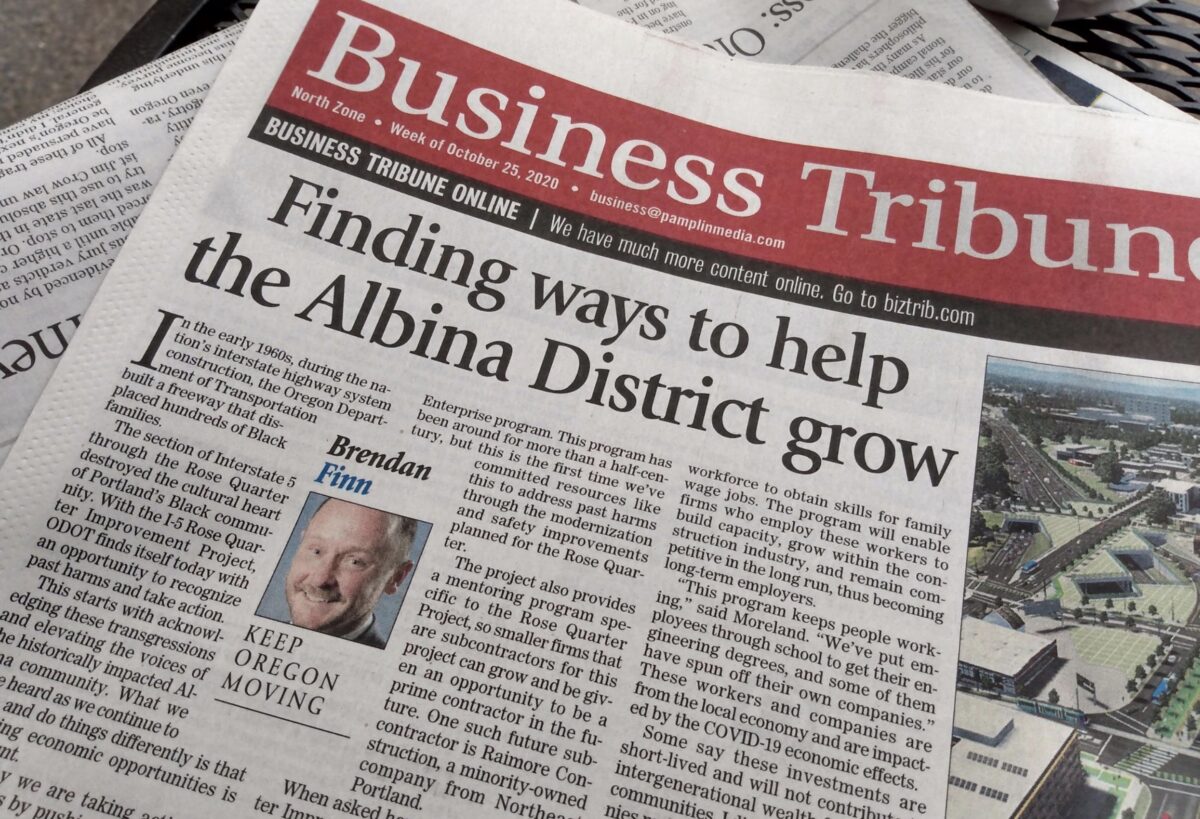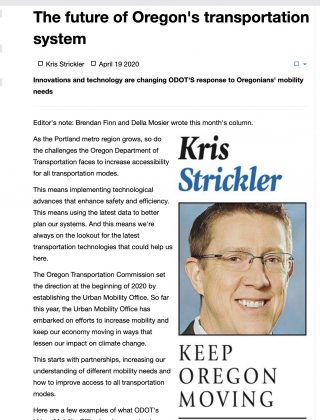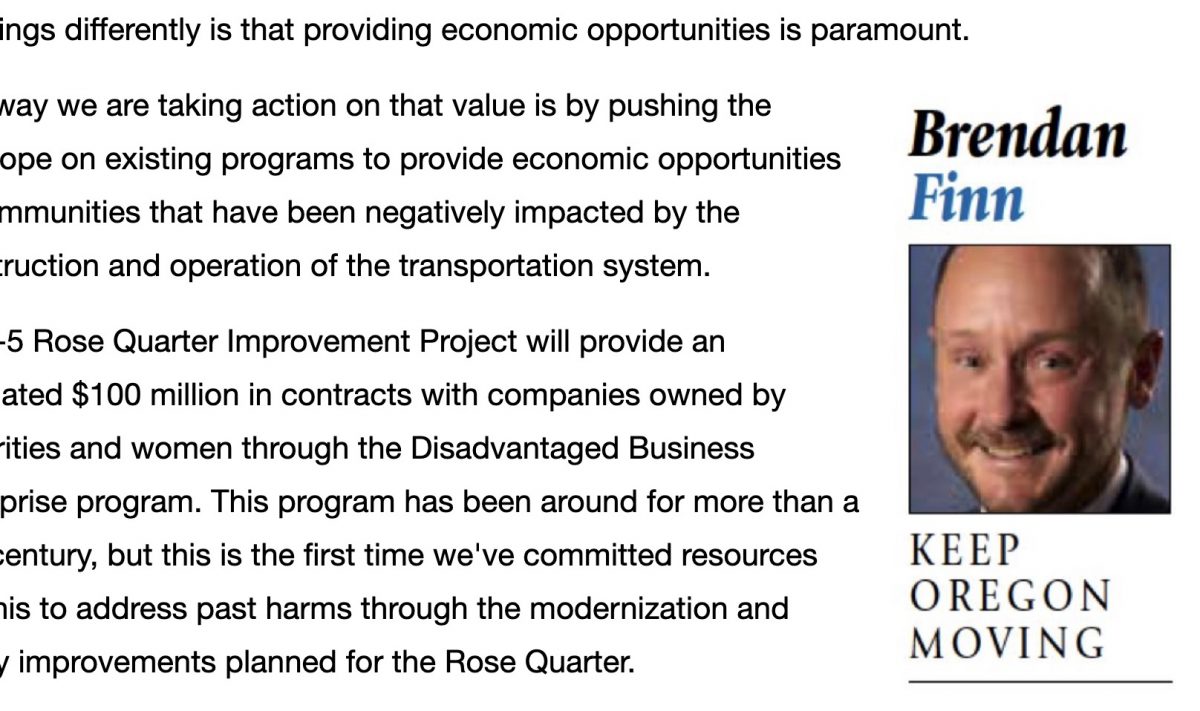
The Oregon Department of Transportation (ODOT) is getting some very positive coverage from the Business Tribune these days.

The sole headline on the front page of the October 24th edition was, “Finding ways to help the Albina District grow.” “ODOT’s Rose Quarter Project will provide opportunities for communities that have historically been left behind,” reads the sub-headline. The story was a glowing review of the project.
To the vast majority of readers, the story looks like it was written by a reporter named Brendan Finn under the innocuous column heading, “Keep Oregon Moving.” As you can see in the photo there’s no clear indication to think anything else.
What most people won’t realize is that Brendan Finn is the director of ODOT’s office of urban mobility and the the face of the I-5 Rose Quarter Project — a project so controversial that no major regional elected official supports it, the City of Portland took the unprecedented step of withdrawing as an official federal project partner, and even the non-profit Albina Vision Trust walked away from it months ago. And “Keep Oregon Moving” isn’t a clever column title, it’s what ODOT calls their current transportation funding law.
This is just the latest from the “Keep Oregon Moving” column.


In April, someone named Kris Strickler (who happens to be the ODOT’s director) wrote a column titled, “The future of Oregon’s transportation system” which detailed the myriad ways, “Innovations and technology are changing ODOT’S response to Oregonians’ mobility needs.” And Strickler wrote another article last December titled, “New lanes aid traffic flow,” which informed readers that, “Auxiliary lanes are a well-established tool to improve safety and reduce congestion.” Back in July the leader of ODOT’s climate office, Amanda Pietz penned a piece titled, “ODOT decisions look through the climate change lens: Cleaner air and a reduction in traffic are just two of the benefits of ODOT’s focus on climate change.”
“It’s very clear. I don’t think there can be any misunderstanding.”
— Don Hamilton, ODOT public information officer
All of these stories looked alike. None of them were clearly marked as opinions, the ODOT logo doesn’t appear prominently anywhere, and there’s no clear, above-the-fold indication that the authors are high-ranking ODOT officials. The staffer’s name is in the byline, but it’s not followed by their title or even simply, “ODOT”. There’s also no disclaimer that the views expressed are not those of the Business Tribune or that the articles are part of a publishing partnership between the Tribune and ODOT. The only mention of the connection to ODOT is in italics after a break below the end of the article. If you aren’t one of the handful of Oregonians familiar with these names and faces and you don’t read each word carefully, it’s easy to assume these are Tribune reporters.
ODOT and the Tribune disagree.
ODOT spokesman Don Hamilton says the Tribune approached them about the opportunity last year. “I believe they wanted to hear what ODOT is up to, to have our voice,” Hamilton explained when I asked him about the articles. “It’s very clear. There’s always a picture and it says it’s by an ODOT person, and it’s clearly ODOT’s voice. I don’t think there can be any misunderstanding.”
Tribune Managing Editor Dana Haynes (who previously worked as spokesperson for former Portland Mayor Charlie Hales) agrees with Hamilton. I asked him if he believes most readers would know these articles are written by ODOT staff. “Yes,” he replied, “[Finn’s photo] is the largest image and his tagline identifies him. Also: Newspaper readers understand bylines.” Does Haynes have any concern that the Tribune is allowing ODOT to share biased views on controversial projects? “No,” Haynes replied, “All opinion columns are biased. As are all letters to the editor and newspaper editorial board columns and editorial cartoons. By definition. We also provide (and encourage) people who disagree to send in their own letters and columns. The dialog of an editorial page is an intrinsic part of a newspaper’s job in the community.”
I agree with Haynes about the value of opinions and editorials. I just think the Tribune needs to make it clearer to readers that’s what these articles are — especially when they come from an agency with a long history of lying, obfuscation, and willfully misleading the public.
— Jonathan Maus: (503) 706-8804, @jonathan_maus on Twitter and jonathan@bikeportland.org
— Get our headlines delivered to your inbox.
— Support this independent community media outlet with a one-time contribution or monthly subscription.
